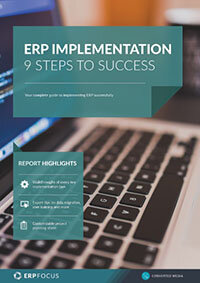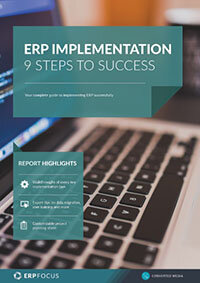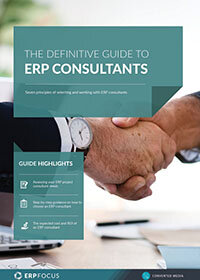2 Key Reasons Why You Need an ERP Consultant
Any serious consideration associated with the implementation, or expansion, of an ERP program represents a number of known and unknown challenges. On the one hand, an apparently efficient enterprise may believe that it’s ready for the effort, but it can suddenly find itself beset with unforeseen operational issues, that trigger a host of critical threats to its bottom-line.
While on the other hand, a less efficient enterprise may be plagued with well-known operational weaknesses that immediately morph from already challenging systems process-handling into the second-coming of DEFCON 1.
The development of an effective ERP consulting relationship is based on 80% trust, backed up by 20% worth of practical performance.
In either event, there are only two practical courses of action. The first is to plow forward, and hope that working the problem internally will resolve over time, or bite the bullet, and look for a helpful third-party resource before things get entirely out of hand. In the latter case, this usually means an ERP consultant; but how does one know that one has identified the right resource, and more importantly, one that offers the most efficient skill set?
Consequently, based on experience, here are a couple of critical milestones that allow an enterprise manager to vet an effective consultant/manager relationship, leading to mutual trust and more importantly, one or more significant business advantages over time.
1. Honest Brokerage
The development of an effective ERP consulting relationship is based on 80% trust, backed up by 20% worth of practical performance. While the latter percentile may appear to allow for failure once an operational ERP evolution gets going, the truth is that if an enterprise manager doesn’t trust an ERP consultant, simply walking through the mechanics of a task list effectively becomes meaningless since no intellectual value can be derived by the experience.
Recommended Reading: ERP Implementation: 11 Steps to Success
This potential lack of value exchange means the ERP consultant must be completely honest with the manager when debating one or another element of their mutual work. If they are not, some arcane process, component or useful idea on the ERP selection or implementation will end up being lost in the translation. Sometimes this is referred to a ‘speaking to power,’ but the success or failure of this kind of interplay can mean the difference between a winning team-based result, versus spending a lot of money for nothing.
When an ERP consultant becomes important: In this case ERP consultants are most effective when enterprise managers lose sight of their own baseline operational requirements, which typically leads to rigid stove-piping, or ready acceptance of quick and dirty work-arounds that ultimately become standardized policies over time.
2. Expanded Vision
In conjunction with the former case, systems and process stove-piping is a well understood enterprise condition, particularly in mature operations that leverage long and successful revenue experiences.
Nevertheless, any business has to grow to live, and at some point change will come to any firm, whether it be small, mid or large scaled enterprise. In this event, an effective ERP consultant, who fosters confidence and trust at the outset, typically offers the client an ability to see the world beyond its own internal doctrinal, cultural and procedural weaknesses.
an effective ERP consultant, who fosters confidence and trust at the outset, typically offers the client an ability to see the world beyond its own internal doctrinal, cultural and procedural weaknesses
Good ERP consultants offer a ‘fresh eyes’ approach to any festering problem, and this expanded vision is particularly useful in the case of highly integrated, data-dependant real-time systems, like ERP platforms.
When an ERP consultant becomes important: The expanded vision afforded by an effective ERP consultant can offer an enterprise a business advantage within most any process-oriented environment, but are most usually applied when decision-making becomes critical once one or more planning rounds have been completed to no effect.
As I said, these are only a couple quick takes on why an enterprise manager might vet, leverage, and potentially secure a consulting resource, but please bear in mind that just as every company is different, ERP consultants are equally disparate as well, so as the old hoary saying goes, ‘measure twice, cut once,’ to be sure that you’re buying the right tool for the job.
Free white paper

ERP Implementation: 9 steps to success
The 9 proven steps you should follow when implementing ERP

Featured white papers
-

The definitive guide to ERP consultants
Seven principles of selecting and working with ERP consultants
Download
Related articles
-

A case study on finding the right ERP consultant
A fictional case study on the impact of hiring the right ERP consultant
-

How the right ERP can help you launch a successful omnichannel business
Petersen Zhu, CEO of DigitBridge and Vibes Base, shares how to create a scalable omnichannel stra...
-

ERP training, and how to train the trainer
Internal or external training - what would be best for your business?

